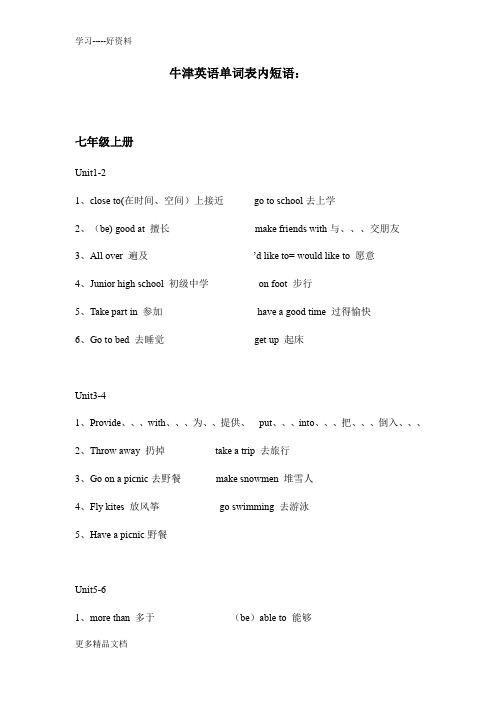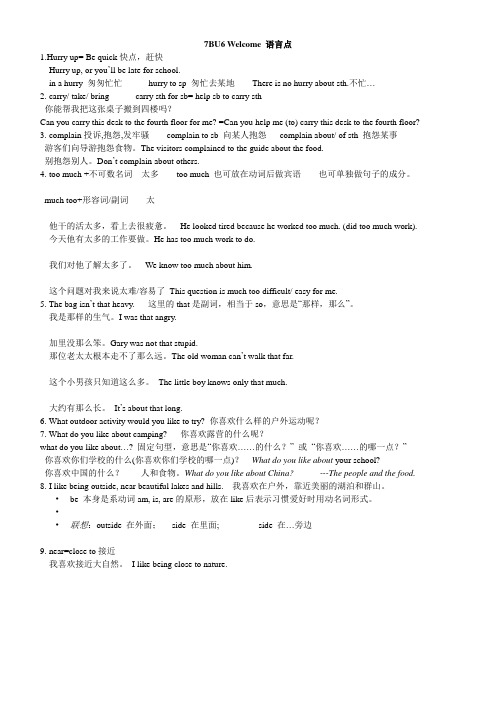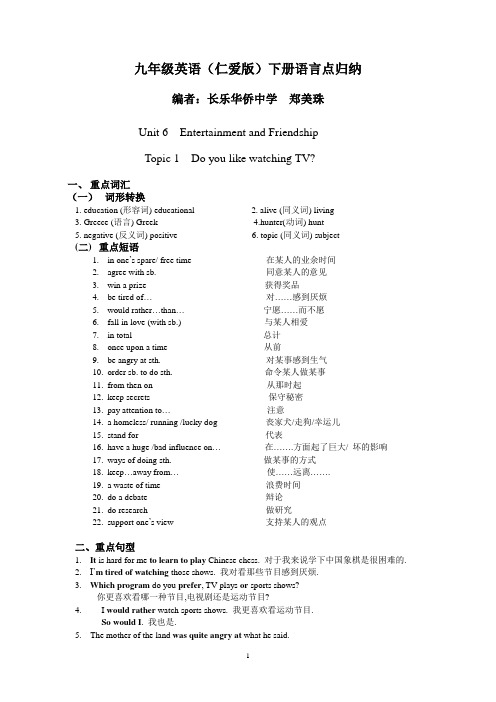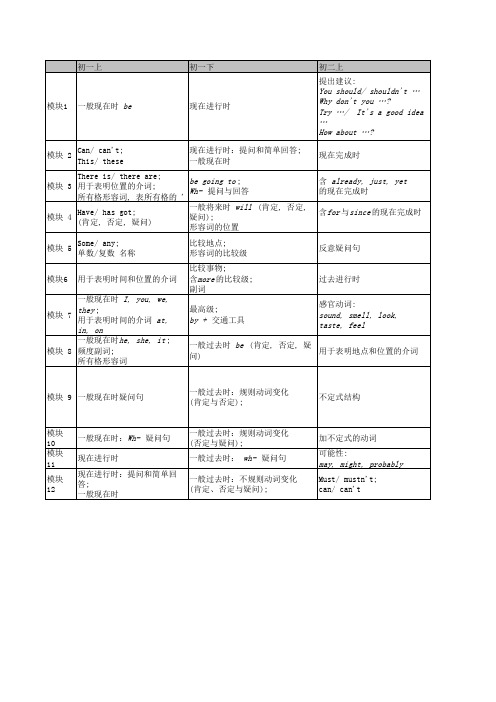七年级下册-九年级英语语言点
七年级下册英语Unit5重点短语

七年级下册英语Unit5重点短语七年级下册英语Unit5重点短语英语(英语:English)是一种西日耳曼语支,最早被中世纪的英国使用,并因其广阔的殖民地而成为世界使用面积最广的语言。
下面是店铺为大家整理的'七年级下册英语Unit5重点短语,欢迎阅读与收藏。
【重点短语】1.importance in Thailand 在泰国的重要性2.Let’s see….first.让我们先看...3.favorite animals 最喜欢的动物4.kind of interesting 有点有趣5.South Africa 南非6.be from =come from 来自7.be smart 聪明的8.walk on two legs 用两条腿走9.all day/all night 整天 /整夜10.a good name for her 对于她是个好名字11.like …a lot 非常喜欢......12.black and white 黑白相间13.You’re right.你是正确的。
14.one of +名词复数(......其中之一)15.our first flag 我们的第一面旗16.a symbol of good luck 好运的象征17.draw well 画得好18.forget to do 忘记做某事19.get/be lost 迷路20.places with food and water有食物和水的地方21.be in great danger 处于危险22.cut down 砍倒23.over = more than 超过/多于24.be made of...由…制成25.Thai Elephant Day 大象节【重点句型】1.—Let's see the pandas first.They're my favorite animals. 咱们先看熊猫吧,我最喜欢熊猫了。
深圳牛津英语新版七至九年级单词表内短语汇编

牛津英语单词表内短语:七年级上册Unit1-21、close to(在时间、空间)上接近go to school去上学2、(be) good at 擅长make friends with与、、、交朋友3、All over 遍及’d like to= would like to 愿意4、Junior high school 初级中学on foot 步行5、Take part in 参加have a good time 过得愉快6、Go to bed 去睡觉get up 起床Unit3-41、Provide、、、with、、、为、、提供、put、、、into、、、把、、、倒入、、、2、Throw away 扔掉take a trip 去旅行3、Go on a picnic去野餐make snowmen 堆雪人4、Fly kites 放风筝go swimming 去游泳5、Have a picnic野餐Unit5-61、more than 多于(be)able to 能够2、Have to 不得不,必须so that以便3、Take photos 拍照as、、、as像、、、一样,如同4、That is 也就是说,即such、、、as 例如5、Travel guide 旅游手册place of interest 名胜古迹6、In the centre of 在、、、的中心light up 点亮,照亮7、In the north-west of 在、、、的西北部Unit 7-81、learn about 学习all the way 一路上,自始至终2、Of course 当然remote control遥控器3、Look up( 在词典或参考书中)查阅、查检4、living room 客厅,起居室(be)bad for对、、、有害的5、(be)interested in对、、、感兴趣6、work of art (绘画、雕塑等)艺术作品七年级下册Unit1-21、as well除、、、之外;也take care of 照顾,照料2、Tell jokes讲笑话make fun of 嘲弄,取笑3、(be)strict about 对、、、要求严格give up 放弃4、Go to work上班all day and all night夜以继日5、(be)famous for 以、、、而闻名department store 百货商店6、Prefer to 更喜欢go on holiday 去度假7、Go sightseeing 去观光Unit3-41、arrive at到达by oneself独自2、Lead (sb)to 带着(sb)到、、、fall asleep 入睡3、Wake up 醒来get down 蹲下,趴下4、Fire engine消防车take in吸收5、Come from来自for example 例如6、In fact(补充细节)确帖地说look around环顾四周7、(be)made of 由、、、制成millions of大量的,数以百计的8、(be)good for 对、、、又用,有好处Unit5-61、Turn off 关掉add、、、to、、、把、、、加入、、、2、A bit有点,一点part of、、、的一部分3、Pocket money(父母给孩子的)零花钱4、(be)make up of 由、、、组成dry up 干涸5、A packet of 一袋in a way 在某种程度上6、(be)connected to 连接到、、、power station 发电站7、Washing machine洗衣机switch off 关(电灯、机器)等8、Tidy up 收拾妥,整理好air conditioner 空调Unit7-81、(not)at all 一点也(不),完全(不)(be)worried about 为、、、担忧2、Newspaper stand报摊rush out冲出去3、a crowed of 一群in the future将来4、used to 曾经go outside 外出5、look like看起来像、、、more and more 越来越多6、grow up 长大go sailing 去进行帆船运动。
七年级下册英语(苏教版七年级)7BU6-Welcome-语言点

7BU6 Welcome 语言点1.Hurry up= Be quick快点,赶快Hurry up, or you’ll be late for school.in a hurry 匆匆忙忙hurry to sp 匆忙去某地There is no hurry about sth.不忙…2. carry/ take/ bring carry sth for sb= help sb to carry sth你能帮我把这张桌子搬到四楼吗?Can you carry this desk to the fourth floor for me? =Can you help me (to) carry this desk to the fourth floor?3. complain投诉,抱怨,发牢骚complain to sb 向某人抱怨complain about/ of sth 抱怨某事游客们向导游抱怨食物。
The visitors complained to the guide about the food.别抱怨别人。
Don’t complain about others.4. too much +不可数名词太多too much 也可放在动词后做宾语也可单独做句子的成分。
much too+形容词/副词太他干的活太多,看上去很疲惫。
He looked tired because he worked too much. (did too much work). 今天他有太多的工作要做。
He has too much work to do.我们对他了解太多了。
We know too much about him.这个问题对我来说太难/容易了This question is much too difficult/ easy for me.5. The bag isn’t that heavy. 这里的that是副词,相当于so,意思是“那样,那么”。
九年级英语(仁爱版)下册语言点归纳.

九年级英语(仁爱版)下册语言点归纳编者:长乐华侨中学郑美珠Unit 6 Entertainment and FriendshipTopic 1 Do you like watching TV?一、重点词汇(一)词形转换1. education (形容词) educational2. alive (同义词) living3. Greece (语言) Greek4.hunter(动词) hunt5. negative (反义词) positive6. topic (同义词) subject(二)重点短语1.in one’s spare/ free time 在某人的业余时间2.agree with sb. 同意某人的意见3.win a prize 获得奖品4.be tired of…对……感到厌烦5.would rather…than…宁愿……而不愿6.fall in love (with sb.) 与某人相爱7.in total 总计8.once upon a time 从前9.be angry at sth. 对某事感到生气10.order sb. to do sth. 命令某人做某事11.from then on 从那时起12.keep secrets 保守秘密13.pay attention to…注意14.a homeless/ running /lucky dog 丧家犬/走狗/幸运儿15.stand for 代表16.have a huge /bad influence on…在…….方面起了巨大/ 坏的影响17.ways of doing sth. 做某事的方式18.keep…away from…使……远离…….19.a waste of time 浪费时间20.do a debate 辩论21.do research 做研究22.support one’s view 支持某人的观点二、重点句型1.It is hard for me to learn to play Chinese chess. 对于我来说学下中国象棋是很困难的.2.I’m tired of watching those shows. 我对看那些节目感到厌烦.3.Which program do you prefer, TV plays or sports shows?你更喜欢看哪一种节目,电视剧还是运动节目?4.----I would rather watch sports shows. 我更喜欢看运动节目.----So would I. 我也是.5. The mother of the land was quite angry at what he said.大地的母亲对他所说的相当的生气.6.Whenever scorpions appeared, hunters would hide.无论蝎子什么时候出现,猎人们都会躲藏起来.7.As we know, there are differences between western culture and Chinese culture.众所周知, 中西方文化存在着不同.三、重点知识点1.I would rather watch TV shows than sports shows. 我宁愿看电视剧而不愿看运动节目.would rather…than…表“宁愿……而不愿”, 与prefer…to…同义,但它们在结构上不同.前者是would rather do sth. than do sth.,后者是prefer doing sth. to doing sth.eg: I would rather stay at home than go out. = I prefer staying at home to going out.我宁愿呆在家中而不愿出去.2.Was his wife still alive? 他的妻子还活着吗?alive 表“活着的”, 常修饰人,而不修饰物. 一般作表语或宾补.living 同义, 既可修饰人, 也可修饰物. 在句中既可作定语也可作表语.eg: The old woman is still alive/living.(作表语) 那个老人还活着.The king wanted to keep Gulliver alive.(作宾补) 国王想让格利佛活着.There is no living things on Mars.(作定语)火星上没有生物.3.She ordered a scorpion to hide in the dark to attack him.order sb. to do sth. 命令/要求某人去做某事order sth for sb./ sth. 为某人/ 某物订购某物eg: The doctor ordered me to stay in bed. 医生命令我好好呆在床上休息.He often orders books for his son. 他经常为他的儿子订书.She ordered a suit for her dog. 她为她的狗订购了一套衣服.4.However, sometimes you do not forgive others.然而, 你有时不会原谅别人.forgive sb. sth. 原谅某人某事forgive sb. for doing sth. 请求别人原谅所做的事eg: She could forgive him anything. 她会原谅他的任何事.Please forgive me for disturbing you. 请原谅我打扰你了.5. But in western countries, dogs are considered honest and good friends of humans但是在西方国家, 狗被认为是诚实的, 是人类的好朋友.honest 用作形容词, 表“诚实的; 正直的” . 在句中可作定语, 表语或宾补.He is an honest man. = The man is honest.他是一个诚实的人.固定搭配: be honest with sb. 对某人坦诚相待to be honest 说实话, 老实说Topic 2 The Monkey King is my favorite character一、重点词汇(一)词形转换1. painter (动词) pain2. Dutch (国家) Holland3.argue (名词) argument4. luckily(形容词) lucky5. erase (名词) eraser(二)重点短语1.work hard at…在……方面努力工作2.works of art 艺术作品3.according to 根据4.the introduction to the painting 画的介绍5.express strong feelings 表达强烈的情感6.in the distance 在远处7.win every battle 赢得每一场的战役8.express the real meaning of friendship 说明了友谊的真正含义9.walk through the desert 穿过沙漠10.have an argument 争辩/吵11.slap sb. in the face 打了某人一计耳光12.keep on doing sth. 继续做某事13.take a bath 洗澡14.get stuck in 陷入……15.erase…from…从……当中抹/擦掉16.be good at hiding 善于隐身17.play alone 独自玩耍二、重点句型1.It is a pity that he died when he was very young. 遗憾的是, 他英年早逝.2.What (do you think) are the most important things I need to know about paintings?你认为,关于绘画, 我需要知道的最重要的事情是什么?3.Well, that depends on what kind of paintings you want to learn.4.Then you can decide whether you want to become a painter or not.(宾语从句)那时你就能决定是否想成为一名画家.5.It says here that Gu Kaizhi is quite good at painting figures.( 宾语从句)这儿写着顾恺之尤其擅长画人物画.6.The way he shows things in the distance is different from the way Gu Kaizhi does.(定语从句) 他描绘远景的方式与顾恺之不同.7.Perhaps that is the reason why I prefer to paint landscapes.(定语从句)也许那就是我为什么更喜欢画风景画的原因.8.…, it was Sandy and Pigsy who helped the Monkey King win every battle.(定语从句)沙僧和猪八戒帮助美猴王赢得每一次战役的胜利.9.One tree can’t make a forest. 独木不成林.10.But without saying anything, he wrote in the sand. 但什么也没说,他写在了沙子中.三、重点知识点1.paint 与draw 都具有“绘画”的含义,但有很大区别paint 表示用颜料等画带有色彩的画, 如油画、水彩画及画正式的肖像画。
2020新目标七年级英语下册知识点总结

2020新目标七年级英语下册知识点总结有时候,很多亊情根本无法解释清楚。
不要难过,挺起身来,去坦然面对,因为路,不一定是直的;不要抱怨,淡然沉静,去真诚处置,因为人,不一定永远是对的;更不要掩饰,坦坦荡荡,因为人与人之间的交流,需要的是信任,无愧于心。
在学习方面也是一样,做到问心无愧就好。
下面就是小编为大家梳理归纳的知识,希望大家能够喜欢。
2020新目标七年级英语下册知识点总结Unit 1 Where’s your pen pal from?一、词组be from= come form 来自... pen pal=pen friend 笔友 like and dislike 好恶;爱憎live in +地点在...居住 speak +语言讲某种语言 play sports 做体育运动a little French 一些法语go to the movies 去看电影 write to sb 给某人写信an action movie 一部动作片 on weekends 在周末tell sb about sth 告诉某人某事Excuse me 对不起,打扰 get to 到达、抵达二、句型1、Where+be+主语+from? 主语+be+from+地点.2、Where do/does+主语+live? 主语+live/lives in…3、What language do/does +主语+speak? 主语+speak/speaks….4、主语+like/likes+doing/to do…5. What is your favorite subject/sport? My favorite subject/sport is…6. It’s fun.7. Is that your new pen pal? Yes, it is.Unit 2 Where’s the post office一、词组post office 邮局pay phone 投币式公用电话 next to 在...隔壁across from 在...对面in front of 在...前面between…and…在...和...之间 on a street 在街上in the neighborhood 在附近 on the right/left 在右边/在左边behind…在…后面on Green street 在格林街上near…在…附近 go straight 一直走welcome to… 欢迎enjoy+名词/doing喜欢做某事 have fun 过得愉快 play +the+乐器弹奏乐器on one’s right/left在某人的右边/左边 turn right/left 向右/左转 take a walk 散步have fun 玩得开心the way to …去...的路 let sb do sth 让某人做某事take a taxi 打的/乘出租车go down(along)…沿着...走go through...穿过.. have a good trip 旅途愉快 arrive at(小地方) /in(大地方)到达 at the beginning of 在...开始的时候 at the end of 在...结束的时候 hope to do sth/that/for sth二、日常交际用语。
外研版初中英语课本语言点总结表

一般过去时:规则动词变化 (否定与疑问); 一般过去时: wh- 疑问句
加不定式的动词 可能性:
may, might, probably
一般过去时:不规则动词变化 (肯定、否定与疑问); Must/ mustn't; can/ can't
初二下
初三上
初三下
句子成分(词性): 主语、动词、 宾语(直接宾语、间接宾语)、 宾补、表语、状语
in, on
一般现在时he, she, it ; 模块 8 频度副词; 所有格形容词 一般过去时 be (肯定, 否定, 疑 用于表明地点和位置的介词 问)
模块 9 一般现在时疑问句
一般过去时:规则动词变化 (肯定与否定);
不定式结构
模块 10 一般现在时:Wh- 疑问句 模块 11 现在进行时 现在进行时:提问和简单回 模块 12 答; 一般现在时
含 already, just, yet 的现在完成时 含for 与since 的现在完成时
反意疑问句
模块6
用于表明时间和位置的介词
过去进行时
一般现在时 I, you, we, they ; 模块 7 用于表明时间的介词 at,
感官动词:
sound, smell, look, taste, feel
时态复习: 现在时, 过去时, 将来时; 现在进行时,过去进行时; 现在完成时
冠词
含who, what, how, where,
when, whether 的宾语从句
加-ing 或不定式的动词
一般现在时:被动语态
代词
一般过去时:被动语态; 一般将来时:被动语态 现在完成时:被动语态; 情态动词:被动语态 构词法 (1): 复合词、缩写词 构词法(2): 前缀、后缀
七年级下册英语u6u7知识点
七年级下册英语u6u7知识点
U6:How Do You Learn English?(你怎样学英语)
学习英语是一件不容易的事情,因为英语是一种全球性的语言,学习英语需要掌握其独特的语法、词汇和发音。
下面是学英语的
几种方法:
1. 多听英语:通过听英语音频、看英语电影等方式去熟悉英语
的发音和节奏。
2. 多说英语:通过与外国友人交流或者参加英语角去提高自己
的口语水平。
3. 多读英语:通过阅读英语书籍、新闻或者杂志等资料去提高
词汇量和语感。
4. 多写英语:通过写日记、翻译或者写作文等方式去提高自己
的写作能力。
U7:What Do You Know About Chinese Food?(你了解中国食物吗?)
中国是一个拥有五千年悠久历史的古老文化国家,中国饮食文化也非常丰富多彩。
下面是介绍中国美食的几种方法:
1. 看美食节目:在电视或者网络上找到有关中国饮食的节目,了解中国各地的风味特色。
2. 吃中餐:在中国餐馆品尝正宗的中餐,并且询问中国菜的历史和制作方法。
3. 学习中文菜谱:通过阅读中文菜谱,了解菜肴的名称、材料和烹饪方法。
4. 了解中国菜肴的历史和文化:中国菜肴的历史可以追溯到五千年前的商代,了解中国菜肴的历史可以更好地欣赏和品尝中国的美食。
总结:
七年级下册英语U6U7的知识点非常实用,学习英语需要掌握
各种方法,通过多听、多说、多读、多写去提高自己的英语能力;当了解中国饮食文化时,可以让我们更好地了解中国的历史和文化。
这些知识点都是我们生活中不可或缺的一部分,希望同学们
可以认真学习并应用到生活中去。
七年级下册英语Unit7-Unit12重点汇总
七年级下册英语Unit7-Unit12重点汇总刚上初中觉得英语很难?不要怕,小编今天给大家分享七年级下册英语所有语言点及话题作文全汇总供大家参考,有需要的可以收藏起来哦。
Unit7 It’s raining!短语归纳1. not bad 不错2. at the park 在公园3. take a message for… 为……捎个口信4. have a good time/have a great time/have fun/enjoy oneself 过得愉快5. call sb. back 给某人回电话6. no problem 没问题7. right now 现在8. talk on the phone 通过电话交谈9. some of ......当中的一些10. by the pool 在游泳池边11. drink orange juice 喝橙汁12. study hard 努力学习13. on a vacation 在度假14. in the mountains 在山里15. call sb. 给某人打电话16. write to sb. 给某人写信用法集萃1. tell sb. (not) to do sth. 告诉某人(不要)做某事2. have a great time/have fun + (in) doing sth. 愉快地做某事3. just right for doing sth. 做某事正合适典句必背1. How’s the weather?天气怎么样?2. It’s cloudy. / It’s sunny. / It’s raining.天气多云。
/ 天气晴朗。
/ 天正下雨。
3. How’s it going?情况怎么样?4. Great! /Not bad./Terrible!好极了!/ 不错。
/糟糕!5. Can I take a message for him?我给他捎个口信好吗?6. I’m having a great time visiting my aunt in Canada.我正在加拿大愉快地拜访我的姑姑。
七年级下册英语复习提纲
【导语】虽然在学习的过程中会遇到许多不顺⼼的事,但古⼈说得好——吃⼀堑,长⼀智。
多了⼀次失败,就多了⼀次教训;多了⼀次挫折,就多了⼀次经验。
没有失败和挫折的⼈,是永远不会成功的。
本篇⽂章是⽆忧考为您整理的《七年级下册英语复习提纲》,供⼤家借鉴。
【篇⼀】七年级下册英语复习提纲⼀、词组schl rules 学校规章制度brea the rules 违反规章制度in the hallwas 在过道listen t usic 听⾳乐in the usic r 在⾳乐教室⾥in the dining hall 在餐厅sprts shes 运动鞋g class 体育课after schl 放学后have t d 不得不做t an 太多get up 起床b ten ’clc ⼗点之前ae dinner 做饭the children’s palace 少年宫⼆、句型(1)—Dn’t arrive late fr class.(2)—We can’t listen t usic in the hallwas,but we can listen t it utside.(3)—What else d u have t d?-- We have t clean the classr.(4)--Can we wear hats in schl?--es,we can/ N,we can’t.(5)-D u have t wear a unifr at schl?-es,we d /N,we dn’t.重难点精析祈使句:通常⽤来表⽰命令、请求、禁⽌、建议、警告等语⽓。
它的主语u(听话⼈)通常省略。
其构成通常有以下⼏种形式。
1)Be型(即系动词原型be+表语+其他)。
如:Be quiet,please.否定句Dn’t + be+表语+其他。
如:Dn’t be angr.2)D型(即系动词原形+宾语+其他)。
如:Open u bs,please.否定句Dn’t +实义动词原形+宾语+其他。
完整word九年级英语仁爱版下册语言点归纳,文档
中考英语复习——九年级英语〔仁爱版〕下册语言点归纳Unit5KnowingaboutChina Topic1HowmuchdoyouknowaboutChina?1.习惯用语:livewithsb与某人一起居住placesofinterest名胜millionsof成百万上千万,数以百万计allover/around/throughouttheworld世界各地suchas例如(后跟名词短语)thebirthplaceof发源地anumberof一些,许多〔饰复数名词,做主语时谓复〕thenumberof的数量〔饰复数名词,做主语时谓单〕fetchsb.sth./fetchsth.forsb.给某人取某物gothrough穿过liein位于lieon毗邻〔接壤〕lieto位于附近〔不接壤〕beworthdoingsth.值得做某事hearof听说makeone’sdreamcometrue=realizeone’sdream实现梦想loseoneselfin沉浸于above在的上方;on在〔外表〕上over在的〔垂直〕正上方,〔还表跨越、覆盖〕notonlybutalso不仅而且〔领近原那么〕thesurroundingareaof周边地区besurroundedwith/byflowers被花朵包围besurroundedonthreesidesbymountains 三面环山thehomeof之乡beknown/famousas作为而著称beknown/famousfor因为而著称connectAwithB 将A与B连接/联系起来regardas把看作goonavisitto=visit参观breakdown损坏;分解;抛锚takeaway拿走becoveredwith被覆盖dooutdooractivities做户外活动atthesametime同时2.重点句型:1〕It’stwoyearssinceMr.andMrs.GreencametoChina.=Mr.andMrs.GreenhavebeeninChinafortwoyears,(1)They'rethebirthplacesofChineseculture.她们是中国文化的发源地(2),IcanfetchyouGuidetoChina.It’sabook whichintroducesChinaindetail.(3)TibetisinthesouthwestofChina,isn'tit?(4) theyarewellworthvisiting.(5)That’sthemostfantasticplacethatIhaveeverheardof.(6)Thesceneryissoattractivethatvisitorsoftenlosethemselvesinit.(7)HongKongisknownastheOrientalPearlandShoppingHeaven.(8)People'swayoflifeinthenorthisquitedifferentfrom thatinthesouth.(9),butpeopleinthesouthtravelnotonlybylandbutalsobywater.Topic2 I’mbecomingmoreandmoreinterestedinChina’shistory 1.习惯用语:inthefield/areaof 在领域l earnfromsb.向某人学习attheageof在年龄inone'sthirties在某人三十几岁时beproudof以为傲,为而骄傲takepridein以为傲,为而骄傲betheprideof是的骄傲dieof死于searchtheInternet上网搜索search+某地+forsth.搜查某地找某物assoonas就takeanactivepartin积极参加setup建立,创立bringdown推翻1中考英语复习——九年级英语〔仁爱版〕下册语言点归纳passaway去世;消失befullof充满givealecture演讲;讲课achievethevictoryof取得的胜利wipeout彻底消灭,全部摧毁succeedindoing成功做2.重点句型:(1)Hewasagreatthinkerwhohadmanywiseideasandthoughtsaboutnatureandhumanbehavior.(2)Hespenttherestofhislifeteachingandwriting.(3) theChinesepeopleareproudof.(4)It'shardtobelieve!(5)Whenhewasinhisthirties,hetookanactivepartinthebattleagainsttheQingdynasty.(6)Unfortunately,SunYat-senbrokedownfromhardworkandpassedawayfullofregretsonMarch12th.1925.(7),theRedArmysucceededinarrivinginGansuProvincein1936.(8)ConfuciusWasagreatmanwhosesayingsarestillveryfamous.3.重难点辨析:spend,cost,take和pay都可以表示“花费〞,但用法却不尽相同。
- 1、下载文档前请自行甄别文档内容的完整性,平台不提供额外的编辑、内容补充、找答案等附加服务。
- 2、"仅部分预览"的文档,不可在线预览部分如存在完整性等问题,可反馈申请退款(可完整预览的文档不适用该条件!)。
- 3、如文档侵犯您的权益,请联系客服反馈,我们会尽快为您处理(人工客服工作时间:9:00-18:30)。
七年级下七年级下册(Unit 1-Unit 12)重点解读重点解读考点归纳考点e from = be from 注: Where do /does sb come from ? =Where be sb from ? 考点2.询问说什么语言What language do /does sb speak ? Sb speak(s) …考点3.dislike = not like = hate 考点4. There be 句型归纳There be 句型1). 定义:There be 句型表示某处存在某物或某人。
2). 结构:(1) There is +单数可数名词/不可数名词+ 地点状语. (2) There are +复数名词+地点状语. 注:谓语动词be 要与主语(某人或某物)的数保持一致。
当主语是两个或两个以上的名词时,谓语动词要与跟它最近的那个名词一致。
eg. ①There_____(be) a bird in the tree. ②There______(be) a teacher and many students in our classroom. ③There______(be) two boys and a girl under the tree. 3). There be 句型与have 的区别:(1) There be 句型和have 都表示“有”的含义。
区别如下:There be 表示“某处存在某物或某人”;have 表示“某人拥有某物/某人”,它表示所有、拥有关系。
①He has two sons. 他有两个儿子。
办公室里有两个男人。
eg. ②There are two men in the office. (2)当have 表示“包括”、“存在”的含义时,There be 句型与其可互换。
eg. A week has seven days. =There are seven days in a week. 一个星期有七天。
4)There be 的句型转换a).否定句: There be +not +名词+地点注意:not 和no 的区别:not 是副词,no 为形容词,not a/an/any + n. 相当于no+ n.。
第1 页共36 页There are some pictures on the wall. →There aren't any pictures on the wall. =There are no pictures on the wall. b)一般疑问句Be +there +名词+地点?注意:当肯定句中有some 时,要将其改为any(否定变化也一样)。
There is some water on Mars. →Is there any water on Mars? There are some fish in the water. →Are there any fish in the water? c).特殊疑问句There be 句型的特殊疑问句形式有以下三种变化:①对主语提问:当主语是人时,"Who's+介词短语? 当主语是物时,"What's + 介词短语? 注意:无论原句的主语是单数还是复数,一般都用be 的单数形式(回答时却要根据实际情况来决定)。
如:There are many things over there. →What's over there? There is a little girl in the room.→Who is in the room? ②对地点状语提问:Where is / are+主语? There is a computer on the desk. →Where is the computer? There are four children on the playground. →Where are the four children? ③对数量提问:一般有两种句型结构:How many+复数名词+are there+介词短语?How much+不可数名词+is there+介词短语?考点5.with 表伴随1)with + sth 2)with +sth + adj 3)with +sth +介词短语考点6.arrive to(in) /get to /reach 的区别1)arrive in +大地点/ arrive at +小地点= get to …= reach +…2)若地点为地点副词时,则省掉介词in/ at /to 3)若后面没有地点时,只能用arrive 考点7.let 的用法1)Let’s +动词原形. 第 2 页共36 页2)Let +sb + 动词原形3)否定形式: Don’t let sb do sth / Let sb not do sth 4)Let’s not do sth 5)反意疑问句: a) Let’s ….. , shall we ? 考点8.other /else 的区别1)other 放在名词之前2)else 放在不定代词/疑问词之后3)else 的所有格else’s 考点9.across/through /over 的区别1)across “横穿,穿过”(着重强调从一个物体表面的一面到另一面) 2)through “穿过”从物体的内部空间穿过3)over “跨越/越过”从物体上方越过,不与物体表面接触. 考点10.询问天气:How is the weather …?= What’s the weather like …? 考点11.as 作介词. “作为”讲He works as a teacher . b) Let us ….. , will you ? 七年级下册(7—Unit12)七年级下册(Unit 7—Unit12)考点归纳考点1.询问人的长相: What does /do sb look like ? 回答用表示人的外貌或长相的词. What does your aunt look like ? _______ . A. She is tall with curly hair B.She is shy and quiet C.She likes doing chores 考点2.say /tell /speak /talk 的区别1).say :说/讲着重说的内容,它的宾语只能是“话”不是人. 2).tell :告诉某人某事. A) tell sb sth . B).tell sb about sb /sth eak to sb ) talk about sth 3).speak:表示讲何种语言/打电话中4).talk: 交谈. talk to /with sb How do you _____ this in English ? 第3 页共36 页I have something important to _______ you . She can _______ three languages now . He is ______ with his penpal now . 考点3.stop 的用法. 1)stop doing sth停止正在做的事情2)stop to do sth 停下(正在做的事情)来做另一件事3)stop sb from doing sth 阻止某人干某事4)can’t stop doing sth 情不自禁干某事The students stopped ______(talk)when the teacher came to the classroom . They are very tired ,but they didn’t want to stop ______ (rest ). 考点4.remember 的用法1).remember to do sth 记得将要干某事(事没做) 2).remember doing sth .记得曾经做过某事(事已做) 考点5.do /does /did 可作代替动词,代替上文的实义动词,以避免重复. Who broke the window ? Tom _______. Who often helps the old man ? He _______. 考点6.would like 的用法: 1).would like sth . 2).would like to do sth 3).would like sb to do sth 4).Would you like sth ? 的回答: Yes ,please / No ,thanks . 5).Would you like to do sth ?的回答: Yes ,I’d love to / I’d love to , but …. 考点7.spend 的用法: 句型:Sb + time /money +(in) doing sth Sb +time/money + on sth She spent two hours ______(read )a story . 考点8. do some /the + v-ing do some shopping 做某事do some cleaning do some washing 考点9.What about 的用法第4 页共36 页1).What about doing sth ? 2).How about /What about doing sth ?= Why not do sth ? 考点10.句型: How +be +….? 怎么样? 于What +be +……+like ? What was your weekend like ? = 考点11.watch 的用法: 1).watch sb do sth 观看某人做了某事2).watch sb doing sth 观看某人正在干某事The teacher is watching them ______ (play ) football. I often watch her ______(play )football. 考点12.It’s time 的用法1)It’s time for sth 该到某事的时间了2)It’s time to do sth 该到干某事的时间了3)It’s time for sb to do sth 该到某人干某事的时间了考点13.have fun doing sth 很高兴干某事We had great fun _______(play) in the water . 考点14.find 的用法: 1).find sb +adj 发现某人怎么样2).find sb + 名词发现某人是……3).find sb doing sth 发现某人正在干某事4).find it +adj+ to do sth 发现干某事怎么样5).find +that 从句发现……He found it was hard to work out the math problem .= He found____hard ____ work out the math problem 考点15.make 的用法1).make sb do sth 使某人干某事2).make sb +adj 使某人怎么样3).make sb +名词使某人成为……4).make +oneself +过去分词使自己被干某事5).be made to do sth 被迫干某事That made me _______(feel) very happy. 第5 页共36 页___ was your weekend ? His words made me _______(sadly). He raised his voice to make himself _______ (hear). 考点16.句型1)don’t have any money for sth .没有钱干某事2)don’t have enough money to do sth = can’t afford to do sth 没有足够多钱干某事I didn’t have any money for a taxi. I don’t have enough money to buy a car.= I can’t ______ ______ buy a car. 考点17.decide 的用法1)同义词组:decide to do sth= make a decision to do sth = make up one’s mind to do sth 决定干某事2)decide not to do sth 考点18.同义句: What do you think of ….? = How do you like …..? 考点19.can’t stand 的用法1).can’t stand sth /sb 不能忍受某事/某人2).can’t stand doing sth 不能忍受干某事考点20.mind 的用法1).mind doing sth 介意干某事2)mind one’s doing sth 介意某人干某事3)句型:Would you mind …?的回答: 不介意: No,please / certainly not / of course not / Not at all 介意: I’m sorry ,but I do / Yes, I do mind / Better not . Would you mind my _______(close )the door ? 考点21. enjoy doing sth 考点22.too many/ too much /much too 1)too many + 复数名词2)too much + 不可数名词第6 页共36 页3)much too + 形容词或副词考点23.must/ have to 的区别1)must 表示说话人的主观看法,没有时态,人称变化2)have to 表示客观方面的必须,外界迫使某人不得不做某事. 有人称和时态的变化. 3)must 的否定句mustn’t 不容许,禁止4)have to 的否定句don’t /doesn’t /didn’t +have to 不必须= needn’t You needn’t come early = You don’t _____ _____ come early . Unit1—八年级上Unit1—Unit3 考点归纳:考点 1.want sb to do sth 想要某人干某事His father wants him_____(become )an actor. 考点 2.try 的用法: 1).try to do sth 尽力干某事He tries ______(eat) lots of vegetables and fruit every day . 2).try not to do sth 尽力不干某事Wetry______(not let) my teacher down. 3).try one’s best to do sth 尽某人最大努力干某事We should try our best ______ (study) all subjects. 4)词组: try on 试穿have a try 考点3.although 的用法: although /though 引导让步状语从句,“即使,虽然”不能与but 连用,,但可与yet, still 连用。
